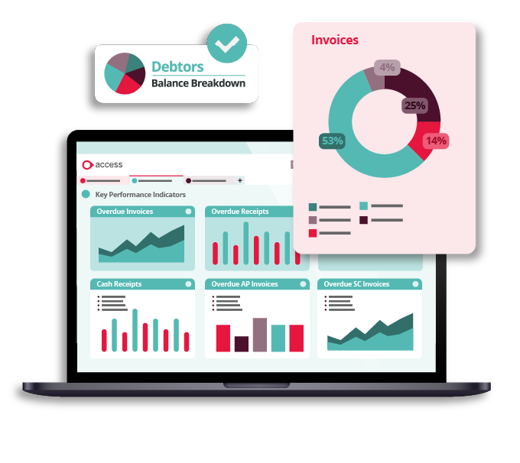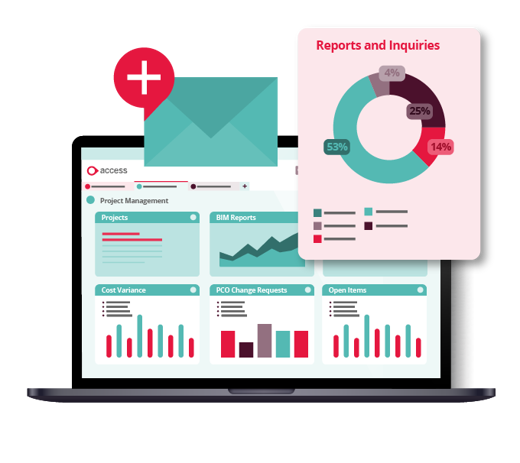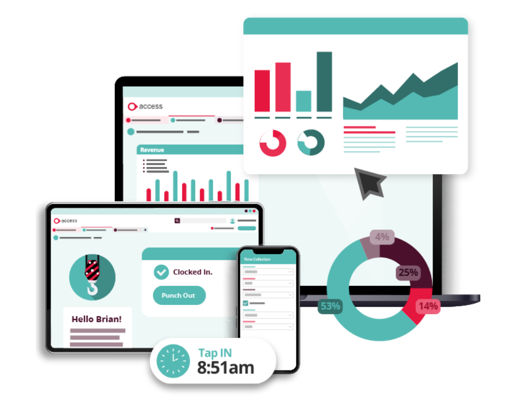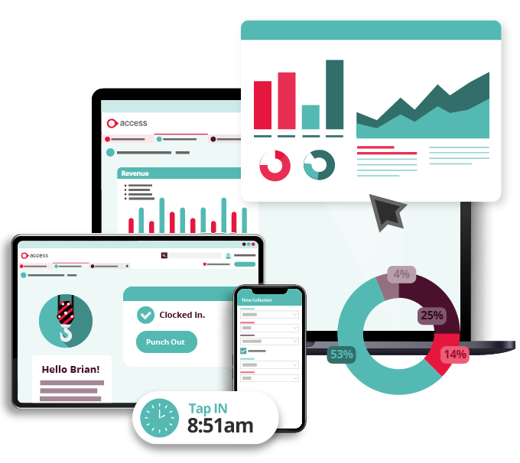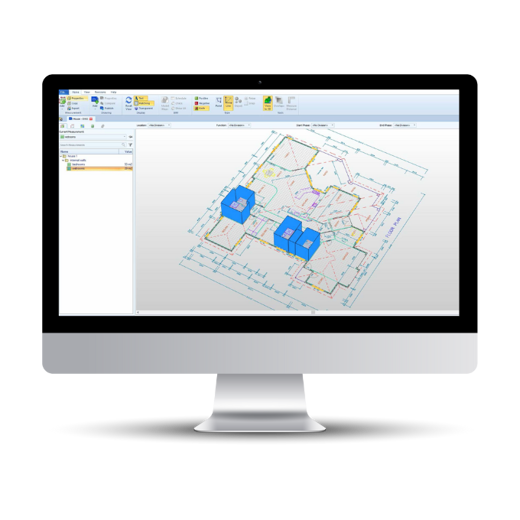AI-enhanced Civil Construction Management Software
Cloud-hosted civil construction software, enhanced with construction-specific AI that understands how you build.
Access Coins Evo is a scalable platform that gives civil contractors total visibility across costs, operations, and compliance for infrastructure projects. Harness AI-driven insights to control cash flow, optimise your supply chain, and speed up builds. Transform complex construction data into actionable intelligence to deliver large, complex projects.

Access Coins Evo is trusted by leading civil construction contractors
Built for civil construction - Deliver complex projects efficiently
Access Coins Evo combines a robust ERP platform with deeply integrated AI to help civil contractors manage large projects with precision and speed.
- Your Single Source of Truth - AI-driven data consolidation gives civil contractors real-time visibility into supply chain, subcontractor performance, and labour costs - all on one platform.
- Financial Management Designed for Construction - Automated compliance checks and bank reconciliation, predictive cash flow forecasting, and board-level reporting keep your finances audit-ready and under control.
- Drive Efficiency Across the Civil Construction Lifecycle - AI-enhanced resource scheduling, job costing, and productivity tracking help you optimise labour and equipment utilisation for maximum efficiency.
- Total Control Over Large Projects - Custom analytics and predictive insights, combined with integrated mobile apps for field-to-office connectivity, ensure complex projects stay on schedule and within budget.

Key features
Access Coins Evo transforms major infrastructure and civil engineering projects by connecting fragmented data sources under one AI-enhanced platform.
Got five minutes? Take a tour of Access Coins Evo
Thames Tideway megaproject achieves gold-star cost control with Access Coins Evo
The Thames Tideway Tunnel ‘super sewer’, a joint venture between BAM Nuttall, Morgan Sindall & Balfour Beatty, chose Access Coins Evo to standardise cost control across the venture, resulting in:
- 30% reduction in delayed payments
- Monthly cost overrun attributed to human error reduced from 17% to 0.5% of costs
- Significant reductions in supply chain disputes

Implementation, support and training from Access Construction
Access Construction works in partnership with your business to ensure you get the most from your ERP or estimating solution.
Access Coins Integrations for Construction Operations
Ready to learn more?

Book a demo
Spend 30 minutes with an Access Coins Evo expert who will build a personalised demo showcasing the features you want to see the most.

Watch a 5-min product overview
Discover how Access Coins Evo centralises your finances, operations and project control under one powerful integrated system

Access Coins brochure
Find out how Access Coins Evo can help you future-proof and scale your construction business.
Civil construction FAQs
What is civil engineering software?
Civil engineering software encompasses digital tools tailored for civil engineering tasks such as designing, analysing, and managing infrastructure projects.
Project management software assists in scheduling, budgeting, and resource allocation. Overall, civil engineering software streamlines project workflows, enhances collaboration among team members, and ensures the efficient execution of large civil engineering projects.
What is the best software for civil engineering?
Determining the best software for civil engineering depends on factors such as project scope, complexity, and specific requirements. However, commonly used software types include:
- ERP (Enterprise Resource Planning): ERP systems integrate various business functions such as project management, accounting, procurement, and inventory management, providing a comprehensive solution for managing civil engineering projects.
- CAD (Computer-Aided Design): CAD software facilitates the creation of detailed drawings and plans for civil engineering projects, including site layouts, structural designs, and infrastructure layouts.
- BIM (Building Information Modelling): BIM platforms enable collaborative project planning and management by creating 3D models that incorporate data on design, construction, and operation phases.
- Structural Analysis Software: This type of software assists in analysing the stability and structural integrity of civil engineering designs, ensuring compliance with safety and regulatory standards.
- Project Management Software: Project management software helps civil engineers plan, schedule, and monitor project progress, facilitating efficient resource allocation, budget management, and communication among team members.
How much does Access Coins Evo cost?
Access Coins Evo is a modular ERP system with varied costs depending on the size of the system chosen.
The upfront cost of Access Coins Evo includes initial implementation, customised set-ups, data migration and training.
Ongoing costs include the system itself, hosting, maintenance, ongoing customisations and any additional modules users may want to implement to boost the functionality of Access Coins Evo.
How is Access Coins Evo different from generic ERP solutions?
Access Coins Evo has been developed specifically for the construction sector, offering unique features that address the complexities of construction projects.
These include:
- Project-specific tracking
- Construction payroll processing
- Equipment tracking
- Industry-specific compliance
- Risk management
- Integrations with construction-specific tools
By integrating these specialised functionalities, construction ERP helps streamline project workflows, ensure accurate cost tracking, and improve overall project delivery and profitability.
What is the typical implementation timeline for Access Coins Evo?
A construction ERP implementation typically takes between 6 to 12 months, depending on a huge range of factors, including:
- The size and complexity of your company
- The scope of the ERP (how many modules you have chosen to implement)
- The level of required customisation
- The amount of data to be cleansed and migrated across systems
Which software is most used in civil engineering?
In civil engineering, the most used software can be categorised into several key types based on their specific applications. These categories include:
1. Computer-Aided Design (CAD) Software
- These are widely used for creating 2D and 3D designs, drawings, and technical blueprints for civil engineering projects. CAD software is essential for drafting site plans, structural layouts, and infrastructure designs.
2. Building Information Modeling (BIM) Software
- BIM software facilitates the creation of intelligent 3D models that provide insights into the physical and functional characteristics of a project. It supports collaboration between engineers, architects, and contractors and is used extensively in planning, design, construction, and management of infrastructure.
3. Structural Analysis and Design Software
- These tools are essential for analysing and designing structures like buildings, bridges, and towers. They help civil engineers assess structural stability under various conditions, including load-bearing capacity, seismic performance, and wind resistance.
4. Geotechnical Analysis Software
- These programs are used to analyse soil behavior, foundation stability, slope stability, and other geotechnical factors critical in construction projects like dams, tunnels, and retaining walls.
5. Transportation and Infrastructure Design Software
- These are used for designing infrastructure such as roads, highways, railways, and drainage systems. They allow engineers to model terrains, design road alignments, and simulate traffic flow.
6. Hydraulic and Hydrology Software
- These tools are used to analyse and design water flow systems, flood mapping, stormwater management, and drainage systems.
7. Project Management Software
- Access Construction: These are critical for planning, scheduling, and managing resources for civil engineering projects, ensuring they are completed on time and within budget.
Each of these software types addresses different aspects of civil engineering, from design and analysis to project management.

 AU & NZ
AU & NZ
 SG
SG
 MY
MY
 US
US
 IE
IE






